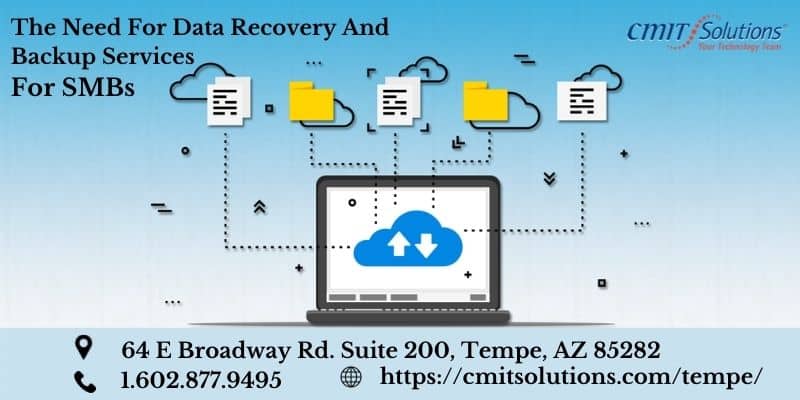Business Continuity: What is it?
Hurricane. Floods. Power blackouts. Cyberattacks. Resignation of a key employee. A contagious illness forcing your staff to take leave.
Anything can disrupt a smoothly running business, causing things to grind to a halt. However, a lengthy downtime is not a luxury for any organization. Rather, it is a disaster in itself, which is why all businesses need a Business Continuity Plan.
Simply defined, “Business Continuity” is all about having strategies to deal with unexpected crises so your organization can continue functioning with minimum disruptions. Investing in effective data protection services and solid backups are the cornerstones of any business continuity plan in this digital era.
Why Does Data Protection Matter for Business Continuity?
Obviously, in this internet-driven world, businesses cannot remain viable without data, which powers everything they do. Therefore, data protection is crucial for any organization, and without it, they are likely to fall victim to a number of perils.
An anonymous quote on the internet best explains the need for business continuity: “It is better to have a Business Continuity plan and not need it, rather than to need a plan but not have it.” This is true when it comes to business technology disasters that permanently render data irrecoverable.
The threats you need to watch out for are:
- Natural disasters like earthquakes, hurricanes, floods, tornadoes, lightning strikes, etc.
- A fire in your office or server room can destroy all hardware.
- Complete internet or a power outage that can last for days or weeks.
- Cyber threats like phishing, ransomware, data theft, or data breaches.
- Hardware failure or corruption caused by users.
- Configuration errors, accidental deletion, or overwriting of data.
Even though these threats may never affect your business, it is important to be prepared for them just in case. Business-wise, planning is better than post-incident damage control since it involves no risk.
3 Critical Reasons Why Data Protection is a Must for Business Continuity
If you are running a data-sensitive business in Tempe or anywhere else in the USA, any form of data loss is nothing short of a catastrophe. As businesses scramble to recover lost documents and recreate resources to recover lost file gaps, the aftershocks of the loss will manifest in many ways, the most disastrous of them being:
1. Productivity loss
The first spoke in the business continuity wheel to be affected when data is not protected is the loss or stagnation of productivity resulting in lesser profits and revenue. Sometimes, the disaster can destroy files used by several employees to ensure task completion or workflow. Some documents may never be retrieved, calling for the recreation of the said document within a narrow timeframe. As long as these tech hurdles remain unresolved, productivity will be severely affected.
2. Reputational loss
Data loss rarely goes unnoticed. Clients become wary as soon as they catch a whiff of the disaster. From there on, the situation can spiral downward, badly affecting years of hard-built trust and reliability. Things can go from bad to worse if your organization stores clients’ data because they will naturally expect that it can never go missing.
3. Business shutdown
The lack of proper data protection strategies or recovery plans can completely cripple your business. The resulting consequences, like reputational damage and loss of revenue, may signal the ultimate shutdown of your business.
Data theft and breaches have been rising over the last couple of years, snuffing out startups and paralyzing established organizations in their wake. In addition, ransomware attacks have caused losses amounting to millions. Many businesses have fallen victim to these meticulously designed cyberattacks, which have left business continuity hanging by a thread.
To keep businesses running in a crisis, it is essential to invest in data protection solutions to guard against corruption, compromise, or loss. What can you do to protect your business and ensure continuity? Read on.
11 Best Data Protection Practices to Ensure Business Continuity
What’s the recipe for a successful data protection strategy? The first step is to create a data inventory by identifying and classifying the type of data you want to retain and protect. The next step is implementing the following measures to restrict access, monitor usage, and respond to threats.
- Create Data Loss Prevention (DLP) tactics, which is a set of tools and strategies to prevent data loss or theft.
- Create data backups and store them separately so you can access updated data when any mishap occurs.
- Create snapshots, a complete image of the protected system, including the data and the system files. A snapshot can restore an entire system to a specific point in time.
- Ensure storage with built-in data protection like disk clustering to enable large-volume storage and quick access for minimal RTO/ RPO.
- Build firewalls to monitor access, filter network traffic, and allow only authorized access or data transfer.
- Replicate your data regularly, so the copy allows immediate recovery even if the primary system fails.
- Encrypt your data and make it inaccessible to unauthorized people. Your data will remain unreadable even if it is stolen.
- Ensure endpoint protection to safeguard your servers, routers, internet connection, access ports, and other devices.
- Erase all unwanted data. Many compliance regulations, such as GDPR, require the erasure of unnecessary data.
- Ensure authentication and authorization to help you verify credentials and apply user privileges correctly.
- Have a set of disaster recovery practices and tech tools to handle cyberattacks, natural disasters, or equipment failure.
The latest tech trend for companies is to collect and store substantial amounts of sensitive information in the cloud. Cloud-based data storage is on the rise because organizations operate through web portals or use software-as-a-service offerings.
In this scenario, companies are more vulnerable because of:
- Lack of information regarding the storage of applications.
- Limited visibility by third-party hosts for data access and sharing.
- Misunderstood or misapplied security responsibilities.
- Inconsistent security with multiple cloud providers or hybrid infrastructures.
- Data is protected under regulations like GDPR, California Consumer Privacy Act (CCPA), and USA Health Insurance Portability and Accountability Act or HIPAA.
It is best to fortify your cloud-dependent data with these four measures:
- Built-in security with strong internal controls and robust tools to safeguard data
- In-transit and at-rest encryption of files before transferring data to cloud storage
- Sound credential policies to prevent abuse of permissions for applications
- Proper measures to secure end-user devices that are vulnerable
Secure Your Data & Ensure Business Continuity with CMIT Solutions, Tempe
Never take chances or compromise with data protection, for it can spell your organization’s success or failure. The key to ensuring business continuity with watertight data protection services is to partner with an experienced firm like CMIT Solutions in Tempe. Call us to know more!
Our IT Services
| Managed IT Services | Cybersecurity | Productivity Applications |
| IT Support | Cloud Services | Network Management |
| Compliance | Data Backup | Unified Communications |
| IT Guidance | IT Procurement |




